Understanding and Protecting Against Echinococcosis
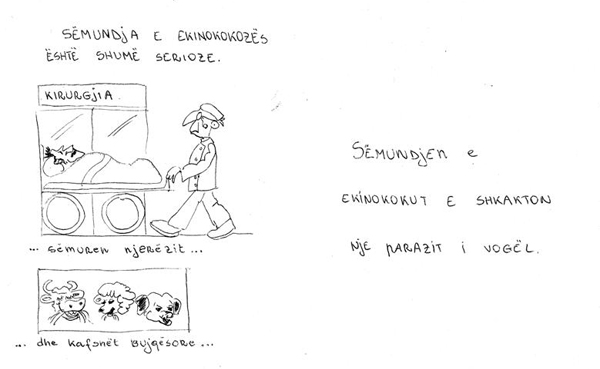
In our country, the usual carrier of Echinococcosis is the infected dog, but the dog itself does not get sick from echinococcosis. It serves to transmit the disease to humans and livestock.
Usually, treatment of the disease in humans requires surgical intervention, while livestock lose their body weight and decrease productivity, thus causing significant physical and economic damage in both ways.
The Echinococcus tapeworm is a small worm about 5 to 7 mm., that has a head, neck, and body. In its mature stage, it is filled with eggs and lives in the intestines of the dog. The latter eliminates them into the external environment through defecation, thus creating the possibility of infecting livestock and humans.
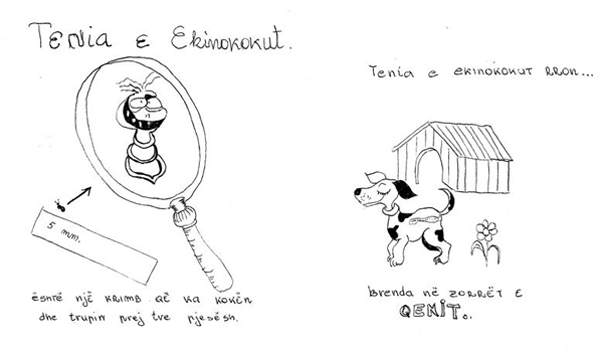
At this time, a new cycle begins for the eggs of Echinococcus. They are very resistant to atmospheric conditions and there is a possibility that livestock, by feeding on grass where the eggs of Echinococcus from the dog's feces have fallen, ingest them as well. Similarly, by eating unwashed vegetables or fruits, or by petting the infected dog, in the absence of careful hygiene, humans can also ingest the parasite's eggs and create the possibility for Echinococcus Cysts to develop in their organism.
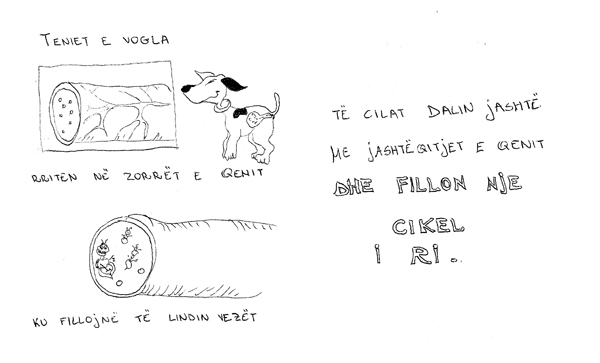
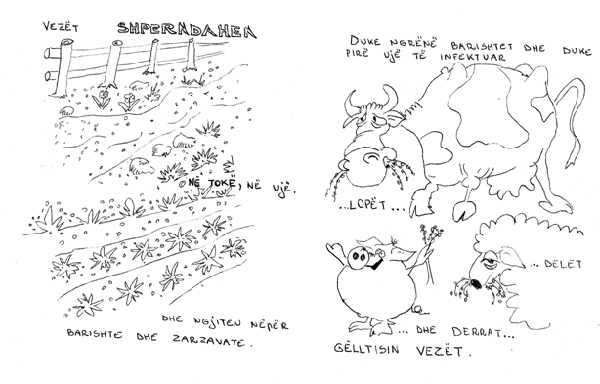
Those most at risk of being affected by this disease are people involved in livestock farming, hunting, but no one is immune from Echinococcosis. Especially children, who are eager to enjoy petting the dog, should be under special care for personal hygiene and not consume unprocessed foods or with unwashed hands.
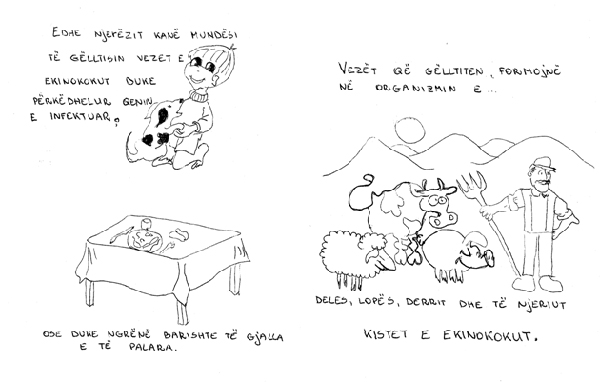
The Echinococcus cysts resemble water-filled blisters of various sizes. They are localized in the liver, lungs, spleen, heart, bones, brain, etc. Over time, they increase their volume and during their evolution, they go through several developmental stages of the organism, disrupting the function of the organ where they are located, and severely compromising the health condition of the affected organism.
Primarily, the prevention of the disease is of special importance, but in the case of being affected by Echinococcosis, the faster the diagnosis is made, the more important it is. The usual treatment tactic for the disease is surgical intervention, but in early cases, there are also other medical or conservative alternatives.
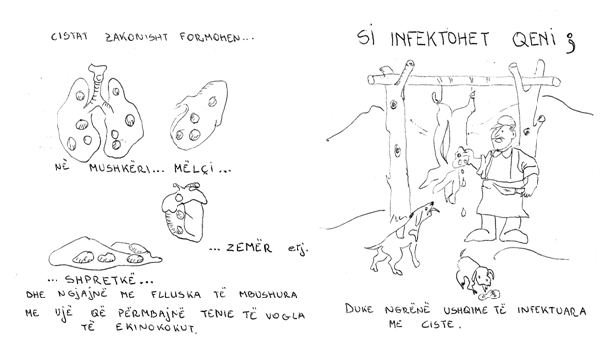
The dog, as the main transmitter in our country for the disease of Echinococcosis, gets infected by eating organs of animals sick with Echinococcosis. For this main reason, slaughtering of animals outside veterinary control must be strictly prohibited and their infected organs should be treated according to existing legislation (burial, burning, composting), etc., and under no circumstances should they be consumed by dogs.
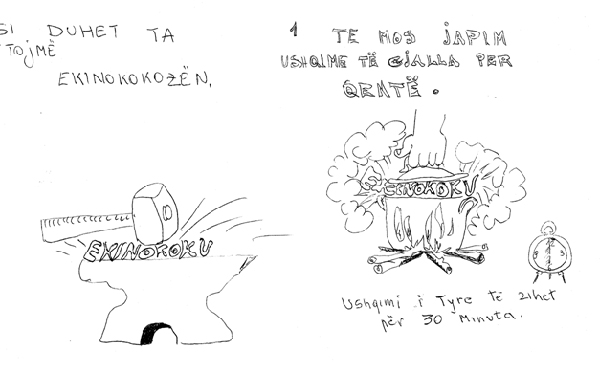
It is indeed pleasant to keep a dog at home, but it must be treated and checked regularly by a veterinarian. The dog should never be left uncontrolled. Otherwise, humans usually "pay for the petting of the dog, with surgical intervention".
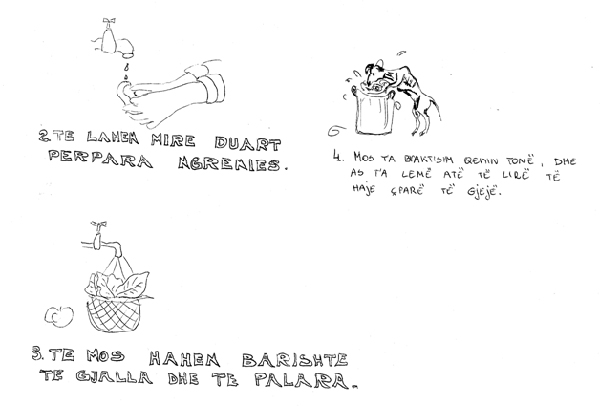
HOW TO PREVENT ECHINOCOCCOSIS
- Do not feed dogs with live food.
- Their food should be cooked for 30 Minutes or use special food for them.
- House dogs should undergo periodic check-ups at the veterinarian.
- Illegal slaughtering without veterinary control must be strictly prohibited.
- Wash hands thoroughly before eating.
- Do not abandon our dog and do not let it freely eat whatever it finds.
- Do not consume raw and unwashed vegetables, fruits, or vegetables.
Graphic presentation: Ledja QERESHNIKU
Interesting, one more reason not to want dogs in the house, otherwise cook for them for 30 min :))
Sent by sara, më 15 October 2012 në 15:48
Dear Sara,
I appreciate your comment and am responding in this manner. In this article, I have provided information for getting acquainted with the disease of echinococcosis, because unfortunately, it is not well known by the general public. On this occasion, I also offer some advice on how to protect ourselves from it. Keeping a dog at home, as much as it is a pleasure and stress relief, is also a responsibility. Every living being requires necessary care. It is not necessary for the dog's food to be cooked separately; it can also be fed with food prepared for humans.
With respect, Dr. Viktori
Sent by Viktor Qereshniku, më 16 October 2012 në 12:27
I wanted to congratulate you for this clarification, even done in an attractive way, very well done ..
Sent by Linda, më 28 October 2012 në 03:18
Dear Linda!
Thank you for your appreciation. Such articles are made with the aim of raising awareness and providing knowledge to the wider population, and especially to make them appealing to children, who are among the most vulnerable to certain infectious diseases, such as Echinococcosis.
With respect,
Viktori
Sent by Viktor Qereshniku, më 28 October 2012 në 10:27
thank you for the very valuable explanations for everyone, but tell us also the symptoms of this disease, how to understand it
Sent by silvana, më 30 October 2012 në 13:59
Silvana, you rightly seek the clinical signs of cystic echinococcosis. They are very polymorphic to severe, or they may even be completely absent.
The purpose of this publication has been to provide general practical knowledge on how to protect ourselves from this parasitosis.
In another article published on mjeket.al, you will find more information on what you are looking for. However, an abdominal ultrasound examination makes it possible to consider the diagnosis.
Thank you for your appreciation as well as for your comment.
Viktori
Sent by Viktor Qereshniku, më 01 November 2012 në 03:00
Hello.... Is there a medication to treat a dog since the larvae of echinococcosis stay in the intestines?
Thank you
Sent by Halil Caci, më 25 November 2012 në 11:24
Mr. Caci, thank you for showing interest. Certainly, there are preparations as well as coprological proof (whether the dog is a carrier of this parasitology). When it is confirmed that the dog is a host of the parasite, then it needs to be treated and rechecked by the veterinarian. With respect, Dr. Viktori (Surgeon)
Sent by Viktor Qereshniku, më 26 November 2012 në 06:34
Hello, I wanted to ask you about a disease called dog tapeworm that forms in the human lungs where I can find any information about this disease if you have the possibility to inform me about this disease. With understanding. Vedat
Sent by vedat, më 21 February 2013 në 01:53
Dear Mr. Vedat! I congratulate you for having read my article about the prevention of echinococcosis in humans. From the medical literature, I am not aware of any disease with the name that interests you, so I cannot provide any information regarding your request.
With respect. Dr. Viktori
Sent by Viktor Qereshniku, më 22 February 2013 në 13:22
a very valuable and extremely interesting piece of information, I congratulate you on the way of presenting the information. Regards
Sent by sidorela , më 06 March 2013 në 14:20
Hello Dr. Viktori, after having undergone several visits, abdominal ultrasounds, and an MRI, it turned out I have an echinococcus cyst. According to the ultrasound reading by the doctor, it appears to be a non-active dry echinococcus cyst. I am very worried, even though I do not show it to my family. Please, regarding this disease, how is the examination done and approximately how much might it cost? With respect, Denisa Uka
Sent by Denisa Uka, më 14 February 2014 në 15:35
Honorable Mrs. D. Uka!
If you are in Tirana, we can communicate by having all the examinations you have done. Only in this way can I hope to give you a precise opinion on how to act.
My contact number is 0672161158 and 0666007880.
With respect, Viktori
Sent by Viktor Qereshniku, më 18 February 2014 në 13:20
Respected Doctor, I wanted to ask you a question. I am from Kosovo. My daughter is 8 years old and has been diagnosed with a disease in the liver. They say it's a cyst in the liver, but I have heard that you have studied this disease. Can it be cured, and is it somewhat dangerous?
Sent by ramiz nishori, më 14 March 2014 në 14:05
Mr. Nishori, I share your concern, but I would tell you that the presence of a cyst in the liver does not always have to do with echinococcosis. However, conducting SEROLOGY analysis and a good ULTRASOUND can guide you more accurately towards the diagnosis.
I thank you for your consideration, but you in Kosovo also have Dr. A. Krasniqi in Pristina, who is very competent for this pathology.
With respect,
Viktor Qereshniku
Sent by viktor QERESHNIKU , më 19 March 2014 në 00:22
At the moment, I am writing from the MHH Hospital in Hanover, Germany. A 10-year-old boy has been diagnosed with the echinococcosis virus and has been successfully operated on. According to German doctors, if the disease is not treated, it is fatal. Symptoms in my son have included minimal appetite, discomfort while sleeping, rapid fatigue, and distortion of the body to the right side because the cyst was in the lung on the right side, of a size of 1.5 liters. We should be more careful with cleanliness, but it can happen to anyone
Sent by Fehmi Tahiri, më 21 April 2014 në 03:08
Z. Fehmi, I wish for your son to recover as quickly as possible. Since he has undergone surgery in Germany, the specialists there will provide the necessary advice. However, do not neglect the post-surgery check-ups, and if you have a pet, it must be checked by a veterinarian.
All the best
Sent by Dr . viktori , më 21 April 2014 në 08:58
Hello .. I have been operated on twice for echinococcosis in the lung by Dr. Agron Myzenxhiu but I still have some small cysts in my ribs. I use albendazole zentel 800 ml per day. The cyst was empty, I was operated on 12 years ago and again 2 years ago. Now I have a flu condition but when I cough, the last ribs on the left side hurt. What do you suggest I do ??
Respect to you, doctor!
Sent by Lumturi Bojni , më 30 November 2014 në 08:28
Doctor, I had a question regarding this topic. My niece was operated on for this diagnosis in the lung and also has another operation in the liver for the same reason. The problem is that during the operation, the cyst burst. I wanted to ask if it can recur and, if so, after how much time it might appear again
Sent by mondi, më 05 April 2015 në 12:28
I am a person who has been operated on due to this diagnosis. I was infected and had 2 cysts, one 25 cm and the other 12 cm. But I have been operated on 8 months ago at the Prishtina hospital by Dr. Kujtim Ukëperaj
Sent by nderim, më 10 May 2015 në 17:35
Please, I need information on where we should go here in Albania, my relative has come out with this blood test result for echinococcus (the test was done in Italy):
Test Results U.M. Reference Values
ECHINOCOCCUS IgG 25.8 U.A. < 8.5 Negative
8.5 - 11.5 Doubtful
> 11.5 Positive
Sent by ELDA, më 26 September 2015 në 05:12